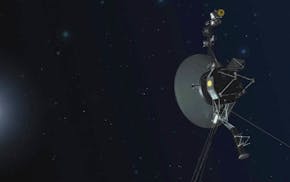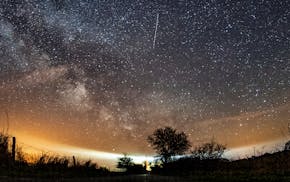in Separate areas, Crickets Go Silent
In 2003, a number of male field crickets on the Hawaiian island of Kauai were born without the ability to chirp. Two years later, the same thing happened on Oahu.
Researchers thought the events were related — a genetic mutation that spread from one island. But now, researchers report that the mutant males on each island stopped singing independently, through two similar but distinct adaptations.
"It's an example of convergent evolution," said Nathan Bailey, a biologist at the University of St. Andrews and an author of the study, which appears in Current Biology. "And it's exciting because we are catching this mutation as it's happening in the wild."
He and his colleagues discovered that different gene markers were responsible for the modified wing structures that allow male crickets to chirp. And although the species, Teleogryllus oceanicus, is found throughout Polynesia and in Australia, the silencing effect has been seen only in Hawaii.
Bailey said the crickets had adapted to become less vulnerable to a parasitic Hawaiian fly that is attracted to the chirp. But there is a downside: The males who do not chirp cannot attract females as easily as those who do. "So instead," Bailey said, "they hang around the remaining singing males and then intercept the females."
are hurricane names misleading?
People are slightly less likely to flee an oncoming storm with a feminine name than a masculine one, a study finds. But hurricanes with feminine names turn out to be deadlier in the United States, probably because their monikers make people underestimate their danger, the researchers conclude.
In fact, the two deadliest storms to make landfall in the U.S. since 1979, when male names were introduced, were named Katrina and Sandy, shown below. "People are looking for meaning in any information that they receive," said co-author Sharon Shavitt, a professor of marketing. "The name of the storm is providing people with irrelevant information that they actually use."
The names for this hurricane season, which began June 1, will be Arthur, Bertha, Cristobal, Dolly, Edouard, Fay, Gonzalo, Hanna, Isaias, Josephine, Kyle, Laura, Marco, Nana, Omar, Paulette, Rene, Sally, Teddy, Vicky and Wilfred.
news services

NASA hears from Voyager 1, the most distant spacecraft from Earth, after months of quiet

The House votes for possible TikTok ban in the US, but don't expect the app to go away anytime soon

Why you should donate clothing: It (probably) won't end up at the dump

Apple pulls WhatsApp and Threads from App Store on Beijing's orders

